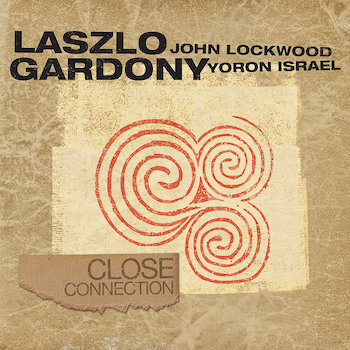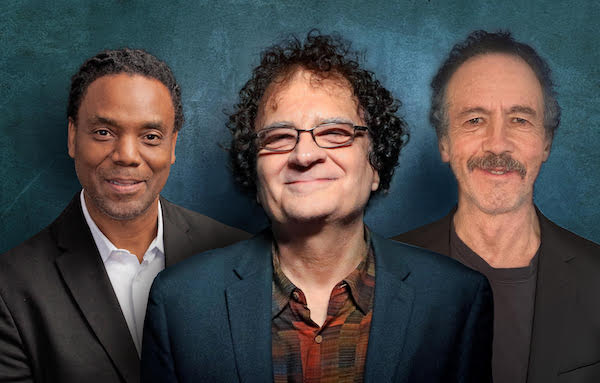Jazz Concert Review: The Laszlo Gardony Trio at Berklee College of Music
By Michael Ullman
The smallish Friend Recital Hall was an ideal setting for pianist Laszlo Gardony to impose his engaging personality, as well as his musical versatility and power.

Pianist Laszlo Gardony’s triumphant performance at Berklee College of Music on January 26 — it ended with a standing ovation — was a celebration both of the trio’s new disc Close Connection and of the return after an illness of bassist John Lockwood to a trio that has been in existence for over 20 years. The smallish Friend Recital Hall was an ideal setting for Gardony to impose his engaging personality, as well as his musical versatility and power.
For the most part, the trio had a thumping good time performing (mainly) the propulsive Gardony compositions on the album, including some gently stated group improvisation. (There are six such improvisations on Close Connection.) After announcing that the evening would reflect all his musical influences, including prog rock, New Orleans music, and Hungarian folk music, Gardony started with his version of “Irrepressible” via slamming opening chords that were played two-handed and staccato. It was as if he were imitating a bass drum. No be-bopping elusiveness here. But then, in a second section, he turned to what sounded to these ears like a folk song, something Bartok might have dug up. Subsequently, Gardony became delicate (for him), limning carefully edited variations on the melody so Lockwood could solo over him.
I once asked an MIT mathematician to describe how he went about his job. He said he made up problems which he then attempted to solve. Gardony introduced his 2017 composition “Times of Discord” precisely as a problem he put to himself and Lockwood and Israel to solve. It was his response, he said, to the political and social ills of that troubling time — it was meant to be difficult to play. (The album title, Close Connection, refers to the links among the trio’s veteran musicians and those between music and challenging external influences.) The theme alternated between a descending single-note phrase, like someone running downstairs, and an aggressive theme, which I heard as a quarter note followed by two eighth notes. The latter was played by the trio members together. It sounded dark, even aggressive, and the improvisations did not lighten up the proceedings: here drummer Yoron Israel got to solo. His turn here — his ability to mimic, to respond to a rapid succession of rhythmic patterns, to enliven through subtleties — was marvelous, as he was throughout the evening. After he finished this piece, Gardony, an excellent host as well as musician, asked the audience if they felt better after this immersion in musical discord. Most of them did.
The band played Gardony’s “Cedar Street Dance,” which is inspired by a 1907 Hungarian painting called Pilgrimage to the Cedars in Lebanon. Csontváry’s picture depicts some sort of joyous ceremony. In front of a giant cedar tree, which dwarfs them, a string of women in white gowns are dancing. In the darkened foreground, in front of the dancers, we see people on horses pointed every which way. In the center of this group is a woman in a large, carriage-like vehicle: drawn by a diminutive horse, it looks like a combination of an easy chair and the inside of a walnut. The painting seems to be less about what the costumed figures are doing — including the endless line of robed dancers — than the huge cedar tree and the light that surrounds it. As he demonstrated here (and on his “Bourbon Street Boogie”), Gardony can make his trio dance.

(l to r) Yoron Israel, Laszlo Gardony, and John Lockwood. Photo: Chris Drucker
“Sweet Thoughts” began with a short introduction by Israel. Then Gardony and Lockwood stated a simple theme in unison. In his modest improvisation over Lockwood, who continued to supply the theme, Gardony introduced trills and turns amidst his longer lines. Later, both pianist and bassist played the melody while Israel took a modest solo. In its innocence, “Sweet Thoughts” was as pleasing and refreshing as a spring shower. The slamming “Strong Winds,” which the pianist implied was influenced by Led Zeppelin, provided a very different experience. Bass and drums introduced the piece: Israel hit three-note unison beats while, at the same time, playing a kind of military tapping on snare drum.
Interrupting the Gardony originals was the trio’s unique version of Duke Ellington’s “In a Sentimental Mood,” which the pianist announced he would approach from “another angle.” He began with a sunny introduction, sprays of notes that made Ellington’s sentiment seem lighthearted. It was an ingenious arrangement; fresh, redolent of Gardony’s own perspective, yet respectful of the melody. There was more that night. In mid-concert, the pianist announced that it was time for some completely improvised music. He started with a delicately stated, heavily pedalled series of strumming notes. Lockwood entered quietly, as if peeking in through a door. Gradually, he and Gardony began to alternately echo each other’s phrases and extend each other’s ideas. Israel entered playing tom toms with mallets. It was a lesson to listeners who might think free improvisation has to be harsh or discordant. The excursion ended with what sounded like an amen. “Beautiful,” someone aptly exclaimed.
Michael Ullman studied classical clarinet and was educated at Harvard, the University of Chicago, and the U. of Michigan, from which he received a PhD in English. The author or co-author of two books on jazz, he has written on jazz and classical music for the Atlantic Monthly, New Republic, High Fidelity, Stereophile, Boston Phoenix, Boston Globe, and other venues. His articles on Dickens, Joyce, Kipling, and others have appeared in academic journals. For over 20 years, he has written a bi-monthly jazz column for Fanfare Magazine, for which he also reviews classical music. At Tufts University, he teaches mostly modernist writers in the English Department and jazz and blues history in the Music Department. He plays piano badly
